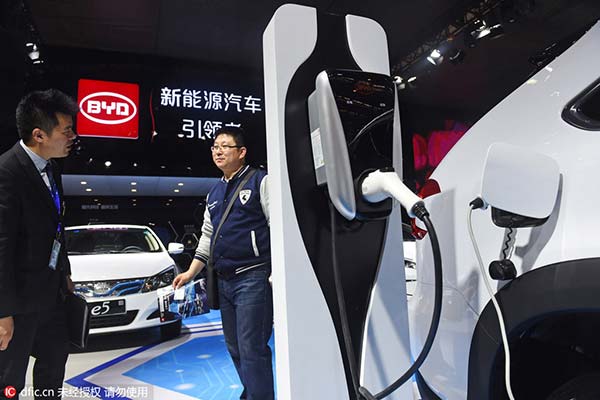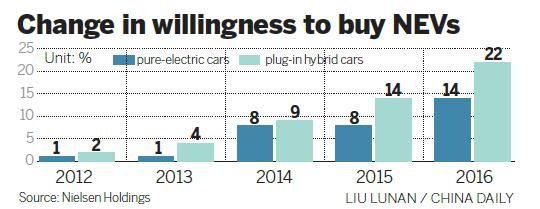 |
|
A Chinese employee talks to a visitor next to plug-in hybrid cars of BYD on display during an auto show in Tianjin, 28 April 2016. [Photo/IC] |
Growth in sales of new-energy vehicles in China may slow in the second half of 2016 after the government cut subsidies and reduced car-purchasing quotas in big cities, Nielsen said in a report published on Monday.
The report, the 2016 Chinese Automobile Consumers White Paper, was jointly released by Nielsen Holdings Ltd and the China Association of Automobile Manufacturers.
It predicts a bright future for gasoline-electric hybrid cars in the long term. Consumer demand for new-energy vehicles is shifting from one that is policy-driven to being driven by individual needs, and NEV owners are young, highly educated and middle class, the report said.
"New-energy vehicles will continue to experience a higher growth rate than gasoline-powered counterparts in the next three years, but the threefold growth of the past two years is no longer possible for the next three years," said Zhao Xinzhi, director of auto vertical of Nielsen China.
Sales of new-energy passenger vehicles in 2018 will be more than triple the 200,000 vehicles sold in 2015, and pure-electric cars will account for the majority of this, he said.

But after 2020, when the subsidies for NEVs end, gasoline-electric hybrid cars and plug-in hybrid cars will experience "explosive growth", Zhao said.
"The three types of cars will be on the same starting line when the subsidies go, and the market will decide," said Zhao, who suggested automakers not only develop pure-electric cars, but also hybrid ones.
He also predicted the proportion of pure-electric cars, plug-in hybrid cars and gasoline-electric hybrid cars will change from the current 6:3:1 to 5:3:2 after three years.
In 2018, annual sales of gasoline-electric hybrid cars will be six to seven times more than last year's less than 30,000 units, as more than a dozen new products will reach the market by that time, Zhao said.
According to Nielsen's report, 14 percent of potential car owners will consider pure electric vehicles and up to 22 percent will consider plug-in hybrid cars. Consumers' increasing acceptance of new-energy vehicles and awareness of environmental protection will become the driving force of the future sales increase.
